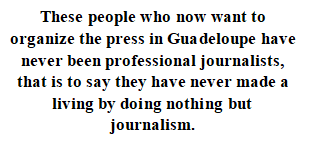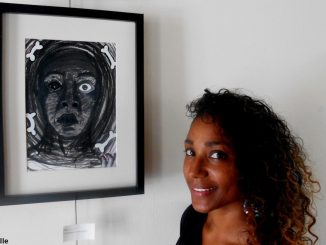
September 14, 2016 – September 14, 2023
This Thursday, Kariculture celebrates its 7th birthday and, as every year, we receive congratulations from our readers. Our warmest thanks go to all of you. Some of these fans live in France, and they salute my courage in returning to Guadeloupe and making my contribution by proposing another media.
In fact, the return to the country of young Guadeloupeans after their studies, which some people are talking about today, is not a new one. Unfortunately, some young people have left, discouraged by the negative reception they received at home; they preferred to build their professional future elsewhere.
I am living proof of this homecoming… but at what price! In reality, young people who are sure to find work or set up a successful business in Guadeloupe are children of politicians, children of relatives-friends-allies of politicians, children of agents and executives in local authorities or public bodies, or children of friends of agents and executives in local authorities or public bodies.
In these public places, you ask to see Mr. X, you are told that Mr. X has retired, but you are introduced to another, younger Mr. X, who turns out to be the son, nephew or cousin of the retired Mr. X.
In short, over the years a sort of “caste” has developed in Guadeloupe.
They talk about competition because it is mandatory for the recruitment of an agent, but I have already heard an elected official say, well before the tests, that “his candidates” had “already passed” the competition, which was a mere formality…

Moreover, after the “Declaration of Basse-Terre”, a text signed by the three regional executives of Guadeloupe, Martinique and Guiana on December 1, 1999, many separatists and communists came to Lucette Michaux-Chevry, President of the Guadeloupe Regional Council at the time, to ask for jobs for their children. They don’t like the governance system but they put their children…
In Guadeloupe, the “big” media, or the media that make money (thanks in particular to subsidies and advertising to the major local authorities), do not belong to Guadeloupeans. But what are our local politicians doing to enable the emergence of new media run by Guadeloupeans? Nothing!
Some communists and nationalists want to organize “Assises de la presse en Guadeloupe” (Press conferences in Guadeloupe), I want to laugh out loud not to have a stroke, because it’s their children who, according to the Creole expression, “cut and chop”, particularly at the Conseil régional de la Guadeloupe (Guadeloupe regional council), so their subsidy applications will have no trouble being processed; others “eat everywhere they can” as long as they can find euro notes of the French state…
These people who now want to organize the press in Guadeloupe – even if they have a media outlet or have worked in a media outlet – have never been professional journalists, that is to say they have never made a living by doing nothing but journalism. These people have or have had a main job, often in the public service. So, the problems of this profession in Guadeloupe, they ignore them.
Today, some are retired and they receive their pension but because of their proximity to certain politicians and their voracity, they still win agreements with local authorities, advertising, press trips etc. What place do they leave to other journalists who have created their media? None.
More and more, young people from this archipelago will study in journalism schools in France, Canada or elsewhere. Some will return to the archipelago, but they won’t all be able to get jobs in the “big” traditional media, they will be forced to create their own media outlet. What will this country offer them?



